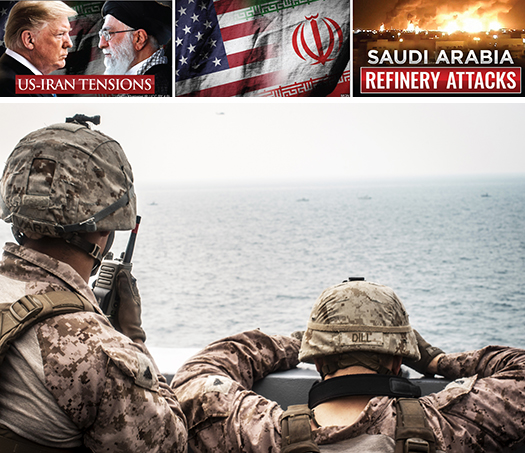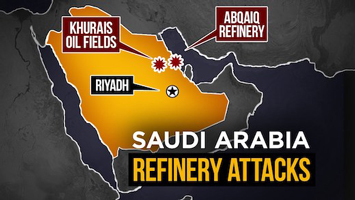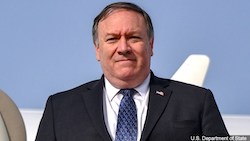Could failed U.S. policy lead to war with Iran?
By Brian E. Muhammad -Contributing Writer- | Last updated: Sep 24, 2019 - 1:59:37 PMWhat's your opinion on this article?

United States antagonism against the Islamic Republic of Iran escalated to dangerous heights in the aftermath of drone and missile attacks on oil refineries in the Abqaiq and Khurais areas of Saudi Arabia. The two facilities are the core of the Saudi oil industry.
The mid-September attacks severely impacted crude oil and natural gas production and intensified geopolitical friction in the Middle East. Houthi rebels fighting a U.S.-supported and Saudi-led coalition in neighboring Yemen claimed responsibility. The U.S. rejected the claim and charged Iran, a mutual U.S.-Saudi foe, was responsible for the attack. Defense Dept. officials said additional U.S. military personnel and weapons were headed to Saudi Arabia to protect the Kingdom and bolster its security.
Britain, France and Germany joined the United States Sept. 23 in blaming Iran for attacks on key oil facilities in Saudi Arabia, according to the Associated Press. Their remarks came as world leaders were gathering for the United Nations General Assembly in New York. “The leaders of the U.K., France and Germany—who remain parties to the 2015 Iran nuclear deal—said in a statement that ‘there is no other plausible explanation’ than that ‘Iran bears responsibility for this attack,’ ” said the Associated Press.

“British Prime Minister Boris Johnson said the U.K. would consider taking part in a U.S.-led military effort to bolster Saudi Arabia’s defenses,” according to the wire service. “French President Emmanuel Macron said at a news conference at the U.N. that he planned to meet separately with both Trump and Rouhani over the next day and would work to foster ‘the conditions for discussion’ and not escalation. Macron called the Sept. 14 strikes ‘a game-changer, clearly’ but reiterated France’s willingness to mediate.”
“This was an Iranian attack,” U.S. Secretary of State Mike Pompeo told reporters on a Sept. 18 flight to Jeddah. “It’s not the case that you can subcontract out the devastation of five percent of the world’s global energy supply and think that you can absolve yourself of responsibilities,” he said. He waved off Houthis taking responsibility as a “fraudulent claim.” Even if true, Mr. Pompeo argued, “it doesn’t change the fingerprints of the ayatollah” in putting at risk the global energy supply. He was referring to Iran’s Supreme Leader Ayatollah Ali Khamenei.

As U.S. officials pushed the “blame Iran” narrative and increased fears of an all-out war, Iran denied involvement in the attacks. Iran also warned Washington and Riyadh that any acts of military aggression would be met with military force.
President Trump pulled back from early language that seemed to suggest a military response and announced additional sanctions, including targeting Iranian banking. Russia said it would ignore the banking sanctions. When the attack happened, China and Russia said U.S. accusations against Iran should not be hastily believed. Pentagon officials also announced Sept. 20 America is deploying more troops to the Middle East in response to the crisis. Specific numbers were not given, and the deployment was requested by the Saudis and the United Arab Emirates. Chairman of the Joint Chiefs-of-Staff General Joseph Dunford remarked that hundreds of troops, “not thousands,” would be deployed. There are currently 70,000 U.S. service members stationed in the region.
“The president has approved the deployment of U.S. forces, which will be defensive in nature and primarily focused on air and missile defense,” said Secretary of Defense Mark Esper.
***image6***Iranian Foreign Minister Mohammad Javad Zarif told CNN it’s “all-out war” if the U.S. and Saudi Arabia opt for a military solution. He questioned why the Americans and Saudis want to “make this up” and blame Iran after the Houthi claim of responsibility. The charges against Iran are based on “lies” and “deception,” charged Mr. Zarif. He called the accusations agitation for war and reiterated Iran’s resolve to defend itself.
Nation of Islam Minister Louis Farrakhan has repeatedly warned against U.S. military action against Iran, saying it would have devastating consequences for America and could usher in a wider global war described in scripture as the war of Armageddon. He has repeatedly urged the Iranians and the Saudis to find a way to resolve their differences to avoid war and more destruction in the Middle East.
During a major address from the Nation of Islam’s flagship Mosque Maryam in July, Min. Farrakhan explained America is ready to go to war with Iran and wants to use Black bodies “to achieve their wicked aims.”
Mr. Trump has walked away from an agreement former President Barack Obama made with Iran, an agreement upheld by powerful permanent members on the UN Security Council. Mr. Trump also didn’t like that the agreement called for the return of some of Iran’s billions of dollars in U.S. banks, the Minister said.
Going to war would put America into much more debt than it’s currently in and Congress would have to go to the Federal Reserve Bank to print more money, he noted.
“America is provoking Iran, but the world is not afraid of America,” the Minister warned, “but our president wants the world to fear him.”
Mr. Trump has warned that if Iran enriches its uranium to a level that could produce a nuclear bomb, then Israel will attack and the U.S. will support Israel, Min. Farrakhan continued. “When you are guilty of evil and you see that (Iran) has the technology to get a bomb, your fear of them having it makes you do things. Mr. President, it would not be a wise move for you,” the Minister warned.
“The first thing to realize is that the reason that we are here is largely because of failed U.S. policy on Iran,” said Mana Mostatabi, communications director for the National Iranian American Council in a telephone interview with The Final Call.
“This is not happening in a vacuum. This did not start in the last couple of weeks,” Ms. Mostatabi continued. “As soon as the U.S. decided to ditch their nuclear deal … imposing their maximum pressure campaign, this is when everything was catalyzed.”
She described Iran and America as locked in an unending “tit for tat.” She pointed out America’s swiftness to conclude—without definitive proof—Iran bombed Saudi oil facilities. The Saudis and other Gulf nations were slightly more cautious. While saying the weapons, described as cruise missiles and drones, were Iranian, the Saudis had not directly stated they were launched from Iran.
“When it comes to figuring out what parties are to blame … we need to really take what the U.S. is saying with a grain of salt,” said Ms. Mostatabi. “This administration, in particular, has a history of distorting and manipulating intelligence on Iran,” she said.
Mr. Trump initially tweeted America was “locked and loaded,” awaiting final verification Iran attacked the Saudi oil facilities. Mr. Trump is also on record saying he doesn’t want war. Hawks in his administration have sent contradictory messages observers say reflect internal divisions and the president’s own ambivalence.
“The Trump administration and the U.S. government in general are suffering from an extreme paradox,” said Brian Becker, national coordinator of the anti-war A.N.S.W.E.R Coalition. “They want to overthrow the independent government in Iran, and they are threatening military action ... hoping that the military threats and the intense economic sanctions would create a division within Iran such that they would have an opportunity to carry out regime change.”
“This administration’s lack of a strategy has led to escalation and confusion in the Middle East,” said Rep. Eliot Engel (D-N.Y.), chairman of the House Committee on Foreign Affairs in a statement.
“While we don’t know who is responsible for the attacks ... without a clear strategy to deescalate tensions with Iran, the situation will only get worse,” he warned.
The Pentagon and United Nations have experts in Saudi Arabia to determine the location from which the attacks were launched.
Houthi rebels said they bombed the oil refineries in retaliation for Saudi atrocities committed in the war against Yemen.
While some argue Iran bears guilt because of their support for the Houthis, Ms. Mostatabi dismissed such reasoning as a “false equivalency.” “There’s a lot of going back and forth about Iranians giving arms to the Houthis,” she said. “We seem to forget that the U.S. is also providing the Saudis arms in the same conflict.”
And, she said, regardless of anti-Iran chest bumping, “any strikes without congressional authorization would be illegal.”
Saudi Arabia and America are not “treaty allies”’ with obligations to engage in war for one another, she noted.
To deescalate hostilities a “real third party” independent investigation is required, argued Ms. Mostatabi. “Neither the U.S. nor the Saudis have the credibility needed to conduct a conclusive investigation,” she said.
In a Sept. 18 report before journalists, Colonel Turki al-Malka, spokesman for the Saudi Defense Ministry, dismissed claims the attacks originated from Yemen, saying it was a false narrative designed to cover Iranian complicity.
Although the Saudi defense spokesman admitted investigations were ongoing to determine the launch point for the attacks, he insisted the strikes were “unquestionably sponsored by Iran.”
Relying on photos, graphics and physical debris from the 25 drones and cruise missiles collected from the targeted sites, the Saudi Defense Ministry presented what they said was evidence of Iranian culpability. Mr. Al-Malka said 18 drones hit the Abqaiq facility, four penetrated the Khurais facility and three fell short.
U.S. Secretary of State Pompeo stuck to an anti-Iranian hardline during meetings with Saudi Crown Prince Mohammed bin Salman and other government officials in Jeddah. Mr. Pompeo labeled the attacks an “act of war” by Iran. “This is an attack of a scale we’ve just not seen before,” Mr. Pompeo told reporters on his flight to Jeddah. “The Saudis were the nation that were attacked. It was on their soil,” he said. “It was an act of war against them directly.”
Mr. Pompeo said flight patterns suggested the attacks didn’t come from the south, in the direction of Yemen, and said American intelligence doubts the Houthis possessed the weapons used.
Mr. Pompeo also admitted the U.S. hasn’t seen evidence of the attack being launched from Iraq or possibly over Kuwait as some speculated.
Concerned about future attacks, Saudi Arabia and the United Arab Emirates signed on to a military alliance dubbed the International Maritime Security Construct led by the U.S. It reportedly includes Israel and is designed to increase security in gulf waters.
The state-run WAM news agency announced the UAE’s decision. Salem Mohammed Al Zaabi, director of the International Security Cooperation Department, said UAE interest is in protecting maritime navigation, global trade, and the “flow of energy supplies” to global markets. The alliance would protect member ships passing through the Strait of Hormuz, Bab Al Mandab, the Sea of Oman and the Arabian Gulf, major oil transportation routes.
Australia, Bahrain and the United Kingdom are also part of the alliance but Iraq declined to join, warning U.S. formation of a military force to allegedly protect strategic waters would only escalate regional tensions.
INSIDE STORIES AND REVIEWS
-
-
About Harriett ... and the Negro Hollywood Road Show
By Rabiah Muhammad, Guest Columnist » Full Story -
Skepticism greets Jay-Z, NFL talk of inspiring change
By Bryan 18X Crawford and Richard B. Muhammad The Final Call Newspaper @TheFinalCall » Full Story -
The painful problem of Black girls and suicide
By Charlene Muhammad -National Correspondent- » Full Story -
Exploitation of Innocence - Report: Perceptions, policies hurting Black girls
By Charlene Muhammad -National Correspondent- » Full Story -
Big Ballin: Big ideas fuel a father’s Big Baller Brand and brash business sense
By Bryan Crawford -Contributing Writer- » Full Story






 Click Here Stay Connected!
Click Here Stay Connected!








